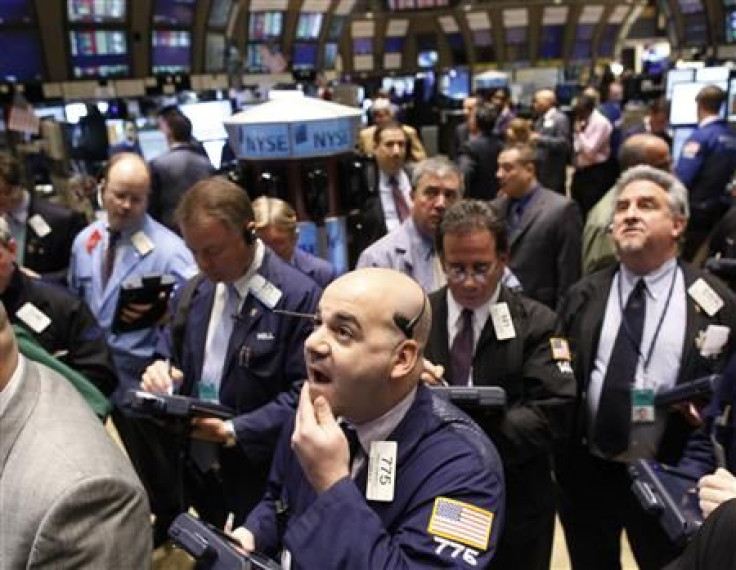World Market Update 15/03/2011

U.S. Markets
U.S. stocks plunged in early trade on Tuesday, following sell-off in European and Asian stock markets amid fears of a nuclear disaster in Japan.
The S&P 500 Index declined 28.57 points, or 2.20 percent, to trade at 1,267.36 at 9:35 EDT. The Dow Jones Industrial Average plunged 243.40 points, or 2.27 percent, to trade at 11,749.76. The Nasdaq Composite Index slumped 2.72 percent.
[Get this delivered to your inbox for FREE. Subscribe to our daily Markets Newsletter.]
Japanese stock markets slumped for the second day on escalating fears of a nuclear crisis after a radiation leak was detected at the Fukushima Daiichi nuclear plant and residents were warned to stay indoors. Benchmark Nikkei index slumped 10.55 percent or 1,015.34 to 8,605.15 after plunging 6.18 percent in the previous session. Meanwhile the Topix index plunged 9.47 percent to 766.73 and recorded its worst two-day slump since 1987.
Japan informed the Vienna-based U.N. atomic watchdog that the spent fuel storage pond at the Unit 4 reactor of the Fukushima Daiichi nuclear power plant is on fire and radioactivity is being released directly into the atmosphere. Dose rates of up to 400 millisievert per hour have been reported at the site.
On the economic front, investors are likely to focus on the FOMC meeting and interest rate decision, which is due to be released at 2:15 pm EDT. The FOMC will probably maintain its current monetary policy as the world’s largest economy is still on its way to recover from the worst recession since the Second World War.
The interest rate is expected to remain unchanged at 0.25 percent. The Federal Reserve kept interest rates at historic lows in the range between 0 percent and 0.25 percent in an attempt to increase consumer consumption and business operations by making borrowing cheaper to revive the economy.
On corporate front, shares of General Electric Co. (NYSE:GE) declined 7.81 percent to $18.77. The company designed all six of the reactors at the Fukushima Daiichi nuclear plant in Japan.
Among the Dow components, Alcoa, American Express and Cisco plunged more than 3 percent, while Boeing, Bank of America, Disney and Verizon slumped more than 4 percent.
European Markets
European stock markets slumped on Tuesday, after Tokyo shares plunged more than 10 percent amid fears of a nuclear disaster in Japan.
The Stoxx Europe 600 Index declined 3.4 percent to 263.24. DAX30 plunged 345.70 points or 5.03 percent to 6,685.77, CAC 40 fell 148.90 points or 3.84 percent 3,729.14 and the FTSE 100 declined 148.90 points or 2.5 percent to 5,631.13.
Germany’s biggest utilities E.ON AG plunged 4.018 percent to 20.78 euros and RWE AG declined 4 percent to 43.25 euros, while French nuclear engineering group Areva SA plunged 9.96 percent to 28.36 euros.
Among the financials, Barclays Plc. declined 1.19 percent, BNP Paribas fell 4.24 percent and Societe Generale declined 5.15 percent.
KBC Groep NV plunged 6.7 percent to 27.35 euros after its bid to sell its private-banking unit to India’s Hinduja Group failed.
On the economic front, the number of employed people in the eurozone rose in the last quarter of 2010, as hiring increased in the agriculture and financial services sectors. The employment rate in the region increased 0.1 percent in the fourth quarter last year compared with the previous quarter.
Asian Markets
Asian stock markets ended sharply lower on Tuesday, with Japanese stock markets slumped for the second day on escalating fears of a nuclear crisis after a radiation leak was detected at the Fukushima Daiichi nuclear plant and residents were warned to stay indoors.
Japan's prime minister Naoto Kan said on Tuesday that radioactive levels had become high around a nuclear power plant damaged by the nation’s biggest earthquake, and there was a risk of radiation leaking into the atmosphere. Kan urged people within 30 km (18 miles) of the facility north of Tokyo to remain indoors and the French embassy in the capital warned in an advisory that a low level of radioactive wind could reach Tokyo within 10 hours.
Benchmark Nikkei index slumped 10.55 percent or 1,015.34 to 8,605.15 after plunging 6.18 percent in the previous session. Meanwhile the Topix index plunged 9.47 percent to 766.73 and recorded its worst two-day slump since 1987.
Shares of Tokyo Electric Power, Japan's biggest utility and operator of the Fukushima nuclear-power plant which suffered an explosion to its No. 3 reactor building after the earthquake, slumped 24.76 percent to 1,221 yen.
Among auto makers, Nissan Motor declined 3.32 percent to 698 yen and Honda Motor declined 3.9 percent to 2,974 yen, while Toyota Motor plunged 7.4 percent to 3,065 yen after halting production at almost all of their domestic plants.
Japanese exporters were also affected as yen strengthened against all of its major counterparts as Japanese firms, including insurance companies, bought back their home currency in order to fund the country's reconstruction. The yen strengthened to 81.54 per dollar in Asian trade.
Among the worst performers, Toshiba Corp plunged 19.46 percent and Hitachi slumped 12.5 percent, while Sumitomo Metal Industries plunged 15.93 percent.
Hong Kong’s Hang Seng index plunged 761.54 points or 3.26 percent to 22,584.34 and Chinese Shanghai composite declined 2.07 percent or 60.93 points to 2,876.70. China Coal Energy declined 2.86 percent and Shandong Gold-Mining declined 3.28 percent, while Zijin Mining fell 3.82 percent.
South Korean shares ended lower, led by declines from technology and steel producers companies. Seoul composite declined 47.31 points or 2.40 percent to 1,923.92. Samsung Electronics declined 4.44 percent and LG Electronics fell 3.33 percent, while POSCO fell 3.48 percent.
More from IBT Markets:
Newsletter: To receive Global Markets update, sign up here
© Copyright IBTimes 2024. All rights reserved.











